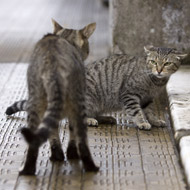Cat owners mistaking fury for fondness

Almost half of all cat owners with two or more cats are mistaking negative body language between their animals.
Almost half of all cat owners with two or more cats are mistaking negative body language between their animals as a sign of affection, according to figures published by Cats Protection.
In a survey carried out by the feline welfare charity, 45 per cent of owners incorrectly thought that cats flattening their ears back, grooming a particular area of their body and taking turns to sit in certain area of the home meant that their cats were living in harmony.
It's not just a case of cat owners being optimistic either. A further 41 per cent mistook positive behaviours, such as touching noses and walking around with an upright tail, as signs of negativity.
Nicky Trevorrow, Cats Protection's behaviour manager said: “The behaviour of cats is subtle and it’s easy to misread the signs because cats have descended from the African wildcat, a solitary hunter, which didn’t develop the complex facial muscles to show a wide variety of expressions.
“There are signs that cats like each other but also there are signs they are only tolerating each other or not getting on at all. These signs include spraying, house soiling, over grooming or becoming withdrawn.”
Cats Protection has seen an 18 per cent rise this year in the number of cats coming to its adoption centre to be re-homed because they do not get along with other cats.
“At any one time Cats Protection is full to bursting looking after more than 5,000 unwanted cats, so by explaining to owners how they can help their cats to get on better, we hope to improve human-cat relations and thereby reduce the number of cats that are unnecessarily given up to Cats Protection,” says Nicky.
The charity are advising owners to introduce cats to each other very slowly, so that they have enough time to integrate with each other peacefully. Rushed introductions can result in cats cohabiting under stress, which can lead to behavioural problems and a lifelong conflict between the cats.
If the cats are already living together and do not get along, then owners should provide separate food, water and litter trays for each cat in different parts of the home. Scrapping cats may block access to each others food, which can cause stress and weaken the chances of reconciliation.
A video explaining how to spot whether felines are friends or foe is available at www.youtube.com/catsprotectionuk.



 RCVS Knowledge has welcomed Professor Peter Cockcroft as editor-in-chief for Veterinary Evidence.
RCVS Knowledge has welcomed Professor Peter Cockcroft as editor-in-chief for Veterinary Evidence.